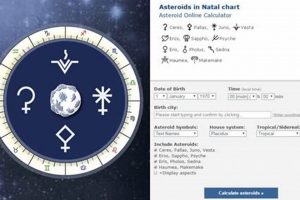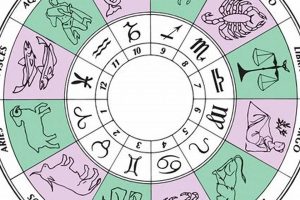In astrological practice, the asteroid Juno’s placement within a natal chart represents committed partnerships, marriage, and long-term relationships. It reveals how an individual approaches these bonds, highlighting their expectations, needs, and potential challenges. For example, Juno in Libra might suggest a strong desire for balance and harmony within relationships.
Understanding this placement offers valuable insights into relationship dynamics, illuminating potential strengths and weaknesses in how individuals approach commitment. This knowledge can be applied to improve existing relationships and inform future partnerships. Historically, Juno, named after the Roman goddess of marriage and childbirth, has been associated with themes of devotion, commitment, and the legal and contractual aspects of relationships.
This exploration delves further into the nuances of this astrological concept, examining its influence in various zodiac signs and houses, and its interplay with other celestial bodies.
Tips for Understanding Astrological Juno
These tips offer practical guidance on interpreting and applying the insights offered by Juno’s placement in a natal chart. They provide a framework for understanding its influence on relationship dynamics.
Tip 1: Determine Juno’s sign and house. Knowing the zodiac sign and astrological house where Juno resides provides the foundation for understanding its influence. This information reveals how one approaches commitment and the areas of life where these themes are most prominent.
Tip 2: Research Juno’s aspects to other planets. Examining the angles formed between Juno and other celestial bodies provides deeper insight into relationship patterns. Favorable aspects can indicate harmony, while challenging aspects may suggest potential conflicts.
Tip 3: Consider Juno’s position in relation to the partner’s chart. Comparing Juno placements in synastry (relationship astrology) reveals valuable insights into relationship dynamics and potential areas of compatibility or discord.
Tip 4: Reflect on personal experiences in committed partnerships. Linking the astrological interpretation with lived experiences provides a personalized understanding of Juno’s influence. This reflection can offer clarity and understanding of past relationship patterns.
Tip 5: Use this knowledge to cultivate healthier relationships. The insights gained from understanding Juno’s placement empower individuals to address potential relationship challenges proactively and build stronger, more fulfilling partnerships.
By understanding these core concepts related to Juno’s placement, individuals can gain valuable self-awareness and improve their approach to commitment. This astrological knowledge offers tools for fostering greater harmony and understanding within relationships.
These insights contribute significantly to a comprehensive understanding of one’s approach to partnerships, ultimately leading to more fulfilling and balanced connections.
1. Commitment
Commitment, a cornerstone of long-term relationships, finds significant representation through Juno’s placement in astrological charts. This celestial body’s position reveals an individual’s inherent approach to commitment, highlighting the values and priorities shaping their dedication to partnerships. Its influence manifests differently depending on its zodiac sign and house placement. For instance, a natal Juno in Taurus suggests a commitment style grounded in stability, loyalty, and sensual connection, while Juno in Sagittarius may signify a commitment driven by adventure, freedom, and shared exploration. Understanding this astrological influence offers valuable insight into how individuals perceive and approach the concept of commitment.
The nature of commitment, as revealed by Juno, extends beyond romantic relationships. It influences all forms of committed partnerships, including business collaborations and close friendships. Consider a scenario where two individuals embark on a joint venture. One possesses Juno in Virgo, prioritizing meticulous planning and practicality, while the other has Juno in Pisces, emphasizing intuition and emotional connection. Recognizing these underlying drives offers an understanding of potential strengths and challenges within the collaboration, enabling proactive navigation of differing commitment styles. Applying this awareness allows individuals to tailor their approaches to collaboration, fostering more effective and harmonious working relationships.
In essence, Juno’s placement provides a framework for understanding commitment styles, offering valuable insights into relationship dynamics. Acknowledging these astrological influences facilitates more effective communication, compromise, and mutual understanding within partnerships. This astrological perspective contributes to a deeper comprehension of the complexities of commitment, empowering individuals to navigate long-term relationships with greater awareness and effectiveness. Integrating this understanding fosters resilience and enhances the potential for lasting, fulfilling connections.
2. Marriage
Within the framework of astrological interpretation, the asteroid Juno holds significant relevance to the concept of marriage. Its placement within a natal chart offers insights into an individual’s predispositions and expectations surrounding long-term committed partnerships, including legal unions. Understanding Juno’s influence can illuminate potential strengths and challenges within marital dynamics.
- Expectations of Marriage
Juno’s sign and house placement reveal an individual’s conscious and subconscious expectations of marriage. Juno in Cancer, for example, might suggest a desire for a nurturing, family-oriented marriage, while Juno in Aries could indicate a preference for a partnership characterized by independence and passion. These inherent expectations significantly influence how individuals approach and experience marriage.
- Challenges in Marriage
Juno’s aspects to other planets can highlight potential challenges within a marriage. A challenging aspect between Juno and Saturn, for instance, could suggest difficulties with commitment or a tendency towards overly structured relationships. Recognizing these potential challenges allows for proactive measures to mitigate their impact.
- Evolution of Marriage
As individuals mature, their understanding and experience of marriage can evolve. Juno’s placement provides a foundation for understanding these shifts, offering insight into how individuals adapt to the changing dynamics of long-term partnerships. This allows for a greater understanding of the evolving needs and priorities within a marriage.
- Compatibility in Marriage
Comparing Juno placements between partners (synastry) can offer insights into marital compatibility. Harmonious Juno aspects can indicate shared values and a strong foundation for commitment. Conversely, challenging aspects may signify potential areas of conflict. Understanding these dynamics can facilitate more open communication and mutual understanding.
By examining these facets through the lens of Juno’s placement, individuals gain valuable self-awareness regarding their approach to marriage. This astrological perspective offers a nuanced understanding of the complexities of long-term partnerships, providing tools for building stronger, more fulfilling marital relationships. Ultimately, this understanding promotes greater harmony and resilience within the context of marriage.
3. Partnership
Within astrological frameworks, Juno’s placement provides crucial insights into an individual’s approach to partnerships of all kinds, extending beyond romantic relationships to encompass business collaborations, close friendships, and familial bonds. Its position signifies the qualities sought in a partner and the dynamics likely to emerge within these connections. Analyzing Juno’s influence offers valuable understanding of partnership dynamics.
- Equality and Fairness
Juno emphasizes the importance of balance and fairness within partnerships. Its placement can reveal whether an individual seeks equal footing in relationships or tends towards dominance or subservience. Juno in Libra, for example, often signifies a strong desire for equality and harmony, while Juno in Scorpio might suggest a need for shared control and intense emotional connection. Recognizing these tendencies provides a framework for understanding power dynamics within partnerships.
- Commitment and Loyalty
Juno’s influence extends to the level of commitment and loyalty an individual seeks and offers within a partnership. Juno in Capricorn, for instance, often correlates with a desire for long-term commitment and stability, while Juno in Gemini might suggest a preference for adaptable and intellectually stimulating partnerships. Understanding these predispositions clarifies expectations surrounding commitment and loyalty.
- Conflict Resolution
Juno’s placement can illuminate an individual’s approach to conflict resolution within partnerships. Juno in Aquarius, for example, might suggest a tendency towards detached problem-solving, while Juno in Pisces could indicate a more emotionally driven approach to conflict. This awareness facilitates the development of effective communication strategies within partnerships.
- Shared Values and Goals
Juno’s influence highlights the importance of shared values and goals in sustaining fulfilling partnerships. Its placement can reveal the types of values an individual prioritizes in collaborative endeavors. Juno in Taurus, for instance, might emphasize shared material security and sensual experiences, while Juno in Sagittarius could prioritize shared adventures and philosophical exploration. Recognizing these values promotes alignment and understanding within partnerships.
By synthesizing these facets, a comprehensive understanding of an individual’s partnership dynamics emerges. This astrological perspective empowers individuals to navigate relationships with greater awareness, fostering stronger and more fulfilling connections. Juno’s influence provides a valuable tool for understanding the complexities of human interaction within the context of various partnerships.
4. Values
The placement of Juno in a natal chart significantly influences the values an individual seeks in committed partnerships. This celestial body acts as a lens through which core relationship values are filtered, shaping expectations and influencing the dynamics of long-term connections. Juno’s position illuminates the principles deemed essential for a fulfilling and sustainable partnership. For instance, Juno in Virgo might prioritize practicality, efficiency, and shared routines, while Juno in Leo could emphasize loyalty, admiration, and romantic expression. These values become integral to relationship satisfaction, acting as cornerstones upon which lasting bonds are built. Understanding these underlying values offers a framework for navigating relationship dynamics and fostering greater compatibility.
The interplay between Juno’s placement and personal values creates a complex tapestry of relational needs and expectations. Consider a scenario where an individual with Juno in Taurus values security, stability, and tangible expressions of affection. This individual might seek a partner who embodies similar values, demonstrating commitment through consistent actions and material support. Conversely, an individual with Juno in Sagittarius may prioritize freedom, adventure, and intellectual exploration within a partnership. This individual might be drawn to a partner who shares a thirst for knowledge and embraces novel experiences. Recognizing the influence of Juno on personal values provides a roadmap for understanding relationship preferences and navigating potential conflicts arising from differing value systems. Addressing these value discrepancies proactively can contribute to greater harmony and mutual understanding.
Integrating the insights offered by Juno’s placement facilitates greater self-awareness and a deeper understanding of relationship dynamics. Recognizing the influence of this asteroid on personal values empowers individuals to seek partnerships aligned with their core beliefs, fostering more fulfilling and sustainable connections. Acknowledging these astrological influences provides valuable tools for navigating the complexities of long-term relationships, ultimately promoting greater satisfaction and resilience within partnerships. This understanding allows for more conscious choices in partner selection and cultivates a deeper appreciation for the diverse expressions of love and commitment.
5. Balance
Within the context of Juno sign astrology, balance represents a crucial element in understanding the dynamics of committed partnerships. It signifies the equilibrium individuals seek within their relationships, encompassing emotional, intellectual, and practical aspects. Juno’s placement in a natal chart offers insights into how individuals perceive and strive for balance within their closest bonds. This pursuit of equilibrium influences relationship choices and shapes the long-term trajectory of partnerships.
- Give and Take
Juno’s influence highlights the importance of reciprocity within partnerships. A balanced relationship involves a healthy exchange of energy, effort, and emotional support. Juno’s placement can reveal an individual’s predisposition towards giving or receiving, impacting their ability to maintain equilibrium in relationships. For example, Juno in Libra often emphasizes fairness and equality in giving and taking, while Juno in Pisces may lean towards self-sacrifice or excessive giving. Recognizing these tendencies allows for conscious efforts towards fostering a more balanced exchange.
- Power Dynamics
Juno’s placement can illuminate the power dynamics within a partnership. Balance in this context involves an equitable distribution of power and decision-making. Juno in Aries, for instance, might suggest a tendency towards asserting dominance, while Juno in Cancer could indicate a preference for nurturing and supportive roles. Understanding these predispositions facilitates open communication about power dynamics and encourages a more balanced distribution of control within the relationship.
- Independence and Togetherness
Finding balance between individual needs and the demands of a partnership is a central theme in Juno sign astrology. Juno’s placement can reveal how individuals navigate this delicate balance. Juno in Aquarius, for example, often signifies a strong need for personal space and independence within a relationship, while Juno in Capricorn may prioritize shared goals and responsibilities. Recognizing these needs allows couples to create space for individual pursuits while nurturing the connection.
- Emotional Expression
Balance in emotional expression involves both sharing vulnerabilities and respecting boundaries. Juno’s placement can offer insight into an individual’s emotional style within a partnership. Juno in Scorpio, for instance, may suggest a tendency towards intense emotional expression, while Juno in Gemini could indicate a preference for lighter, more communicative emotional interactions. Understanding these tendencies fosters empathy and promotes healthy emotional exchange within the partnership.
These facets of balance, as illuminated by Juno’s placement, contribute significantly to the overall health and longevity of committed partnerships. Striving for equilibrium in these areas fosters greater harmony, mutual respect, and a deeper understanding between partners. Integrating these insights empowers individuals to navigate the complexities of relationships with greater awareness and intentionality, cultivating more fulfilling and sustainable connections.
6. Long-Term Growth
Within the framework of Juno sign astrology, long-term growth represents a significant aspect of committed partnerships. It signifies the potential for individual and relational evolution within the context of long-term bonds. Juno’s placement in a natal chart offers insights into how individuals approach and experience growth within their closest relationships, illuminating the areas where development and transformation are most likely to occur. This perspective emphasizes the evolutionary potential inherent in committed partnerships.
- Mutual Support and Encouragement
Juno’s influence highlights the role of mutual support in fostering long-term growth within partnerships. A supportive partner can encourage personal development and provide a safe space for exploring new horizons. Juno in Sagittarius, for example, might signify a partnership that encourages intellectual and spiritual exploration, while Juno in Capricorn could indicate a focus on shared professional and material growth. Partnerships characterized by mutual support create fertile ground for individual and relational evolution.
- Navigating Challenges and Conflicts
Challenges and conflicts inevitably arise within long-term relationships, presenting opportunities for growth and deeper understanding. Juno’s placement can reveal how individuals approach conflict resolution and utilize challenges as catalysts for personal transformation. Juno in Virgo, for instance, might suggest a tendency towards analytical problem-solving, while Juno in Pisces could indicate a more emotionally driven approach to conflict. Navigating these challenges constructively strengthens the bond and fosters resilience within the partnership.
- Shared Values and Goals
Shared values and goals provide a foundation for long-term growth within a partnership. Juno’s placement can reveal the areas where couples are most likely to find common ground and work together towards shared aspirations. Juno in Taurus, for example, might emphasize shared financial security and material stability, while Juno in Libra could prioritize creating a harmonious and aesthetically pleasing home environment. Alignment in these areas fosters a sense of shared purpose and facilitates long-term growth as a couple.
- Adaptability and Flexibility
Long-term relationships require adaptability and flexibility as individuals and circumstances evolve. Juno’s placement can offer insights into an individual’s capacity for adapting within a partnership. Juno in Gemini, for instance, might suggest a natural adaptability and openness to change, while Juno in Scorpio could indicate a resistance to change and a need for emotional security. Cultivating flexibility allows partnerships to navigate life’s transitions and emerge stronger from periods of change.
These facets, as illuminated by Juno’s placement, underscore the profound potential for long-term growth inherent in committed partnerships. By understanding these dynamics, individuals can cultivate relationships that foster personal and relational evolution, creating a foundation for lasting love and mutual fulfillment. This perspective emphasizes the transformative power of partnership and its capacity to support individual growth journeys. Juno sign astrology provides a framework for understanding this transformative process, offering valuable insights into the dynamics of long-term growth within committed relationships.
Frequently Asked Questions
This section addresses common inquiries regarding the astrological significance of Juno, offering concise and informative responses to clarify its role in understanding relationship dynamics.
Question 1: How does Juno differ from Venus in astrological interpretations of love and relationships?
While Venus represents the initial attraction and romantic expression in relationships, Juno signifies the commitment, long-term compatibility, and deeper aspects of partnership, including marriage and legal unions. Venus governs the experience of falling in love, while Juno governs the experience of being in a committed partnership.
Question 2: Can Juno’s placement predict relationship outcomes?
Astrology offers insights into predispositions and potential challenges, not predetermined outcomes. Juno’s placement provides information about an individual’s approach to commitment, but individual choices and external factors also shape relationship trajectories.
Question 3: How does Juno’s influence manifest in different signs and houses?
Juno’s expression varies depending on its zodiac sign and house placement. Juno in fire signs might suggest passionate and independent partnerships, while Juno in earth signs could indicate a preference for stability and practicality. House placement indicates the area of life where commitment themes are most prominent.
Question 4: Is Juno’s influence limited to romantic relationships?
While often associated with romantic partnerships, Juno’s influence extends to all forms of committed relationships, including business partnerships, close friendships, and familial bonds. It reveals the dynamics of commitment and loyalty in various contexts.
Question 5: How can understanding Juno’s placement improve relationships?
Increased self-awareness regarding one’s approach to commitment, facilitated by understanding Juno’s placement, allows for more conscious choices in partner selection and fosters more effective communication within existing relationships.
Question 6: Does Juno’s placement impact the likelihood of marriage?
Juno’s placement does not dictate whether someone will marry, but it offers insights into their expectations and approach to marriage. It can illuminate potential challenges and strengths regarding long-term commitment and legal partnerships. It is essential to consider other astrological factors and individual choices when evaluating the likelihood of marriage.
Understanding Juno’s influence provides valuable insights into the complexities of commitment and partnership dynamics, empowering individuals to navigate relationships with greater awareness and intentionality.
Further exploration of specific Juno sign placements and their implications for relationships provides a deeper understanding of this astrological concept.
Conclusion
This exploration of Juno’s astrological significance reveals its profound influence on committed partnerships. From illuminating individual values and expectations to highlighting potential challenges and growth opportunities, Juno’s placement offers valuable insights into the dynamics of long-term relationships. Key takeaways include the distinction between Juno and Venus in relationship astrology, the importance of balance within partnerships, and the potential for long-term growth facilitated by Juno’s influence. Understanding Juno’s role empowers individuals to navigate relationships with greater awareness.
The insights offered by Juno sign astrology provide a framework for understanding the complexities of commitment and partnership dynamics. Further research and application of these principles can contribute to more fulfilling and sustainable relationships. By integrating this astrological perspective, individuals gain valuable tools for navigating the intricacies of human connection, fostering stronger bonds and cultivating greater relational harmony.







